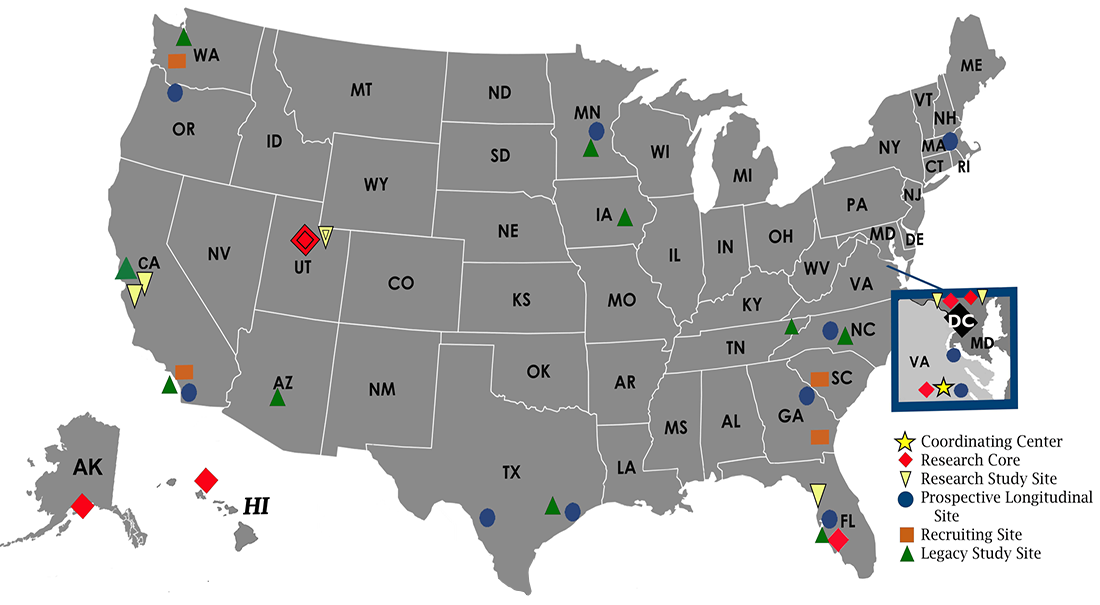Participating Organizations
The following groups work together on LIMBIC-CENC research. Click on any colored shapes on the map below for the specific site/core staff bios or click here to view the full list of LIMBIC-CENC team.
LIMBIC-CENC Sites

The following groups work together on LIMBIC-CENC research. Click on any group below for their official web link.
Affiliate Organizations
The National Center for PTSD is globally recognized as the leading research and educational center of excellence for PTSD and traumatic stress. The National Center for PTSD aims to raise awareness about PTSD and traumatic stress, as well as provide information regarding stress-related conditions, trauma, and treatment options. For additional information, visit the National Center for PTSD website by clicking on the following link: https://www.ptsd.va.gov/.
The Care Consortium endeavors to provide necessary infrastructure and scientific expertise to investigate concussion, with the ultimate goal of obtaining a better understanding about concussive injury and recovery, in order to enhance the safety and health of student-athletes, service members, and the general public. For additional information, visit the Care Consortium website by clicking on the following link: http://www.careconsortium.net/.
The TED Initiative is a collaboration sponsored by the DoD and FDA, which consists of academic clinician-scientists and innovative industry leaders in biotechnology and imaging technology, patient advocacy organizations, and philanthropies. The aim of the TED Initiative is to identify and validate effective measures or “endpoints” of brain injury and recovery, through examining data from athletes, soldiers, and the civilian population. For additional information, visit the TED website by clicking on the following link: https://tbiendpoints.ucsf.edu/.
TRACK-TBI is an international TBI research initiative that aims to better understand the effects of brain injury, through collection and analysis of clinical, imaging, and biospecimen data, with the ultimate goal of identifying treatment methods for TBI. For additional information, visit the TRACK-TBI website by clicking on the following link: https://tracktbi.ucsf.edu/transforming-research-and-clinical-knowledge-tbi.
The Department of Defense, through its Uniformed Services University, has established the world’s only brain tissue repository that is exclusively dedicated to help researchers characterize and understand the underlying mechanisms responsible for the immediate and long-term persistent effects of traumatic brain injury (TBI) experienced by service members. At this unique facility, repository scientists and physicians use innovative approaches to help better understand how to diagnose, prevent, and care for our military personnel who experience the effects of head injury, especially blast TBI, on the human brain. The DoD/USU Brain Tissue Repository (BTR) provides the opportunity for families of deceased active duty and former service members to donate the brain for use in research on this important topic. For more information about the DoD/USU BTR please contact us at 855-366-8824 or https://www.researchbraininjury.org/
The VA-BU-CLF Brain Bank is the largest tissue repository in the world focused upon TBI and chronic traumatic encephalopathy (CTE). The VA-BU-CLF Brain Bank is dedicated to improving understanding about the long-term consequences of TBI, in order to advance diagnosis, treatment, and care of individuals living with brain injury and related conditions. For additional information, visit the VA-BU-CLF Brain Bank website by clicking on the following link: https://www.bu.edu/cte/brain-donation-registry/.
CONNECT-TBI brings together 30 leading investigators from 13 institutions to generate unparalleled, comprehensive neuropathological and clinical data regarding the connection between traumatic brain injuries (TBI) and neurodegenerative disease. With the collective expertise and harmonized databases that this international collaborative achieves, CONNECT-TBI creates new possibilities to characterize TBI related neurodegeneration (TReND) pathology, and understand the extent and distribution of TReND pathology required to produce neurological dysfunction, the spectrum of symptoms associated with this pathology, and its relationship with wider neurodegenerative disease. For additional information, visit the CONNECT-TBI website by clicking on the following link: http://connect-tbi.med.upenn.edu//.


